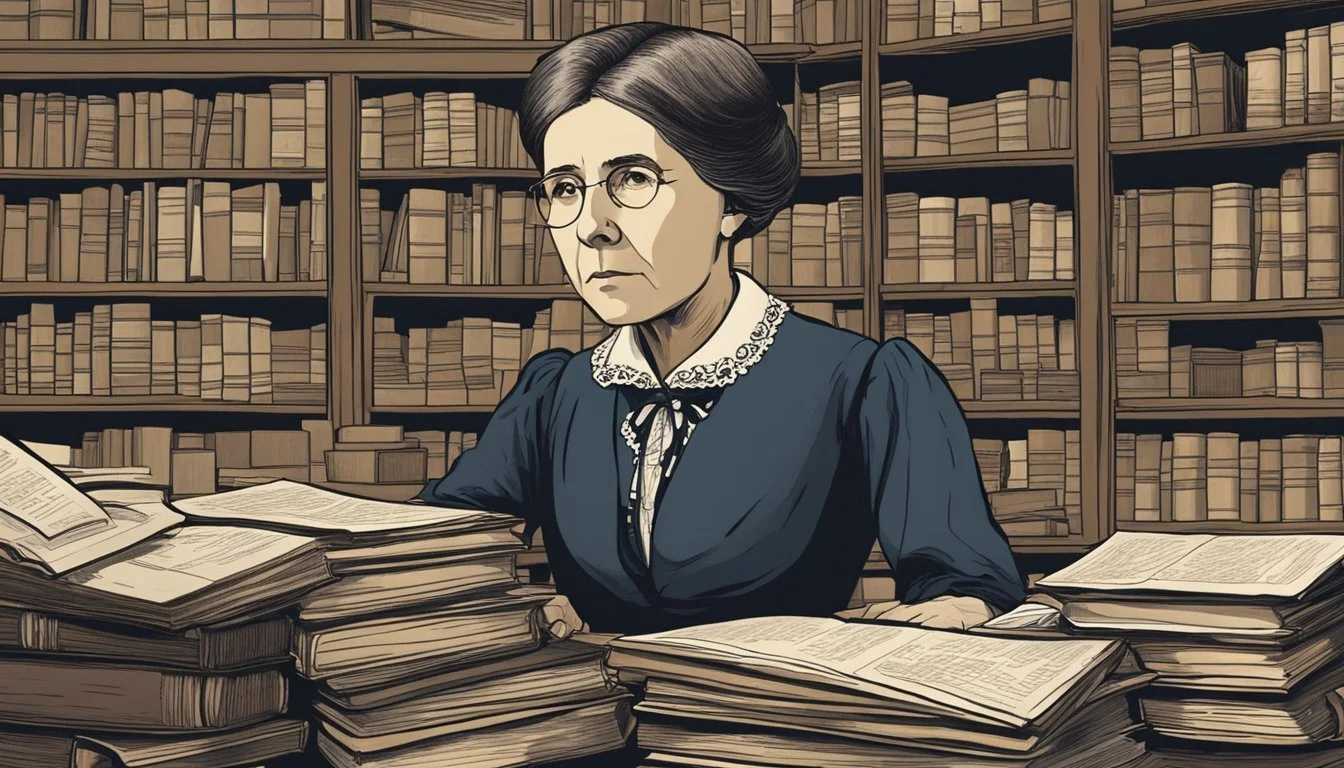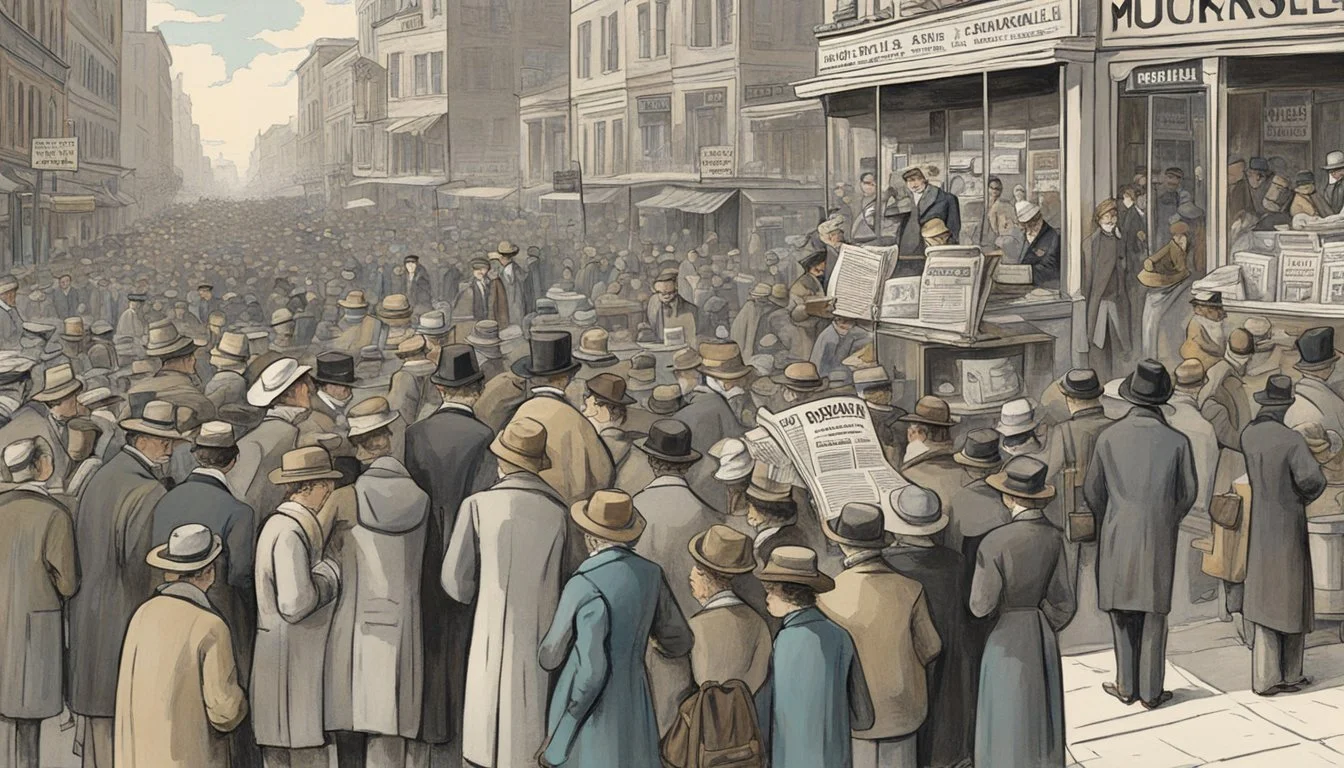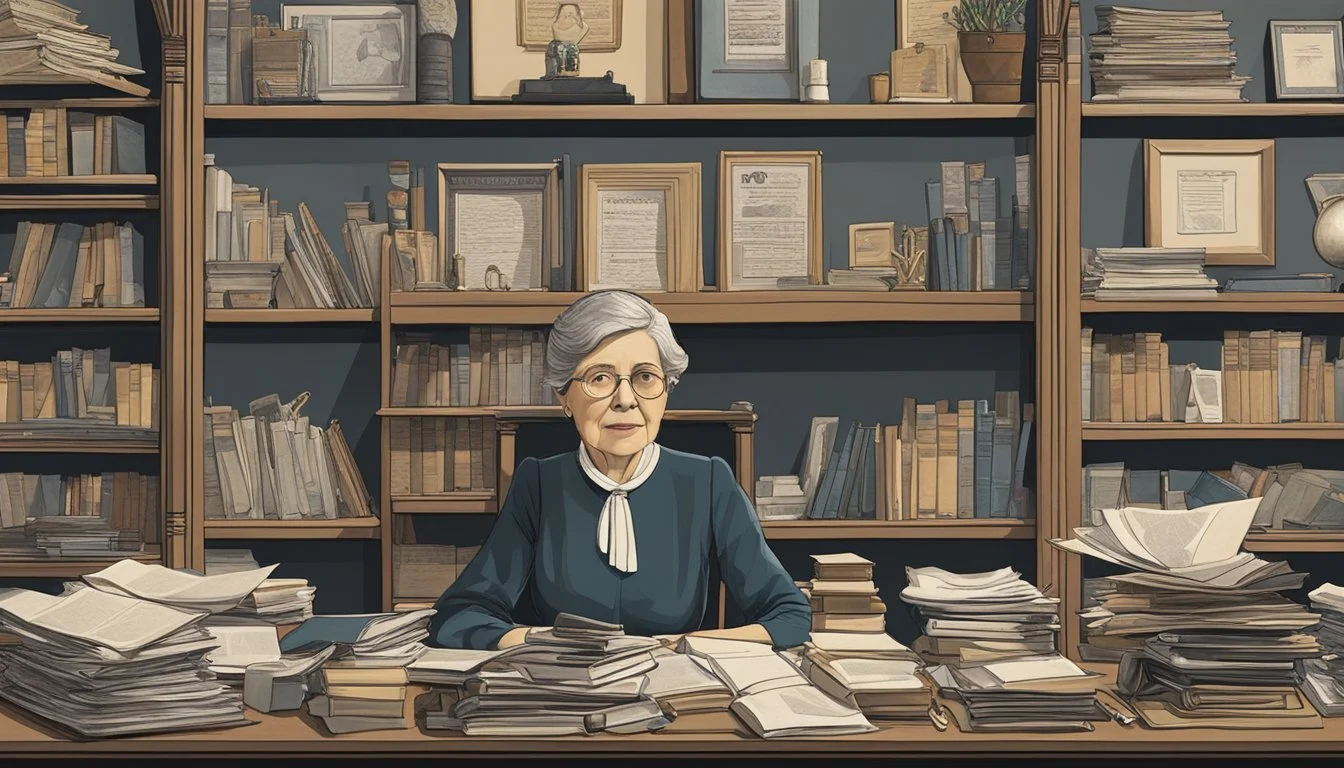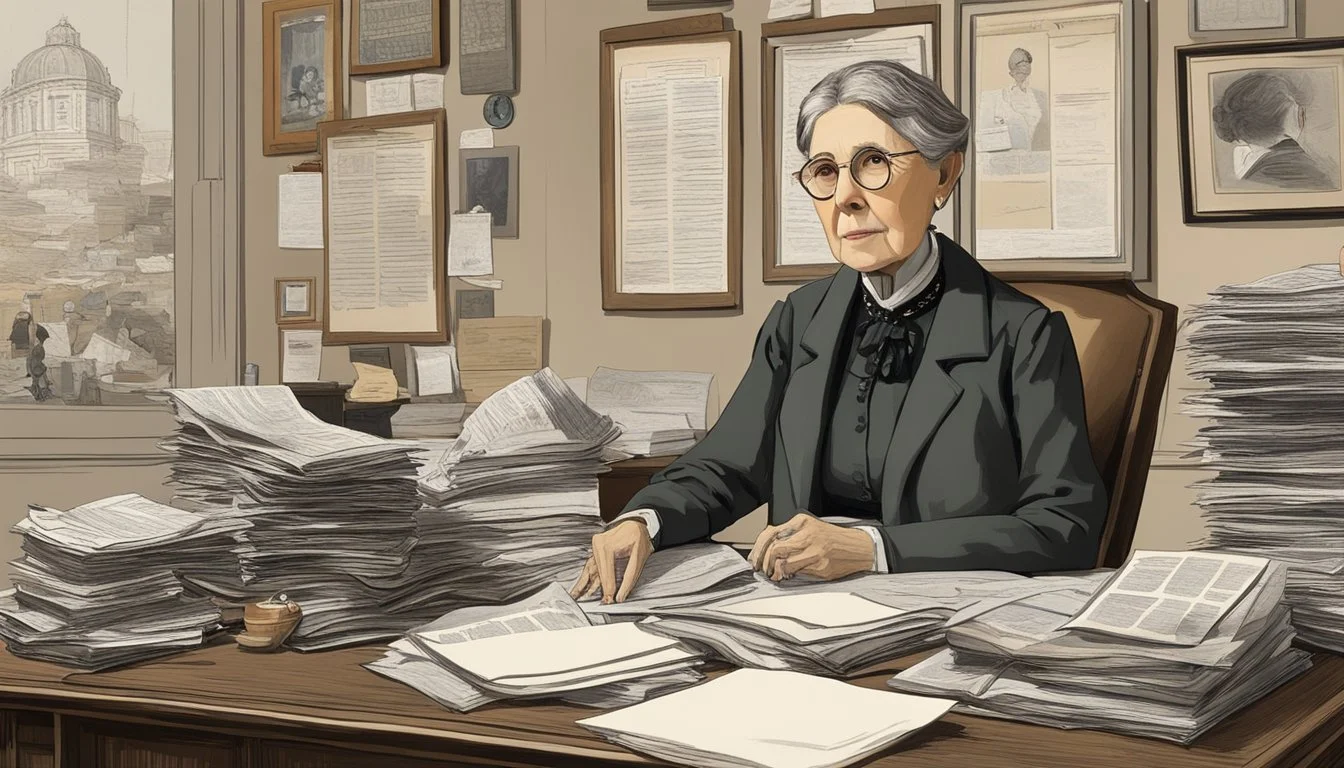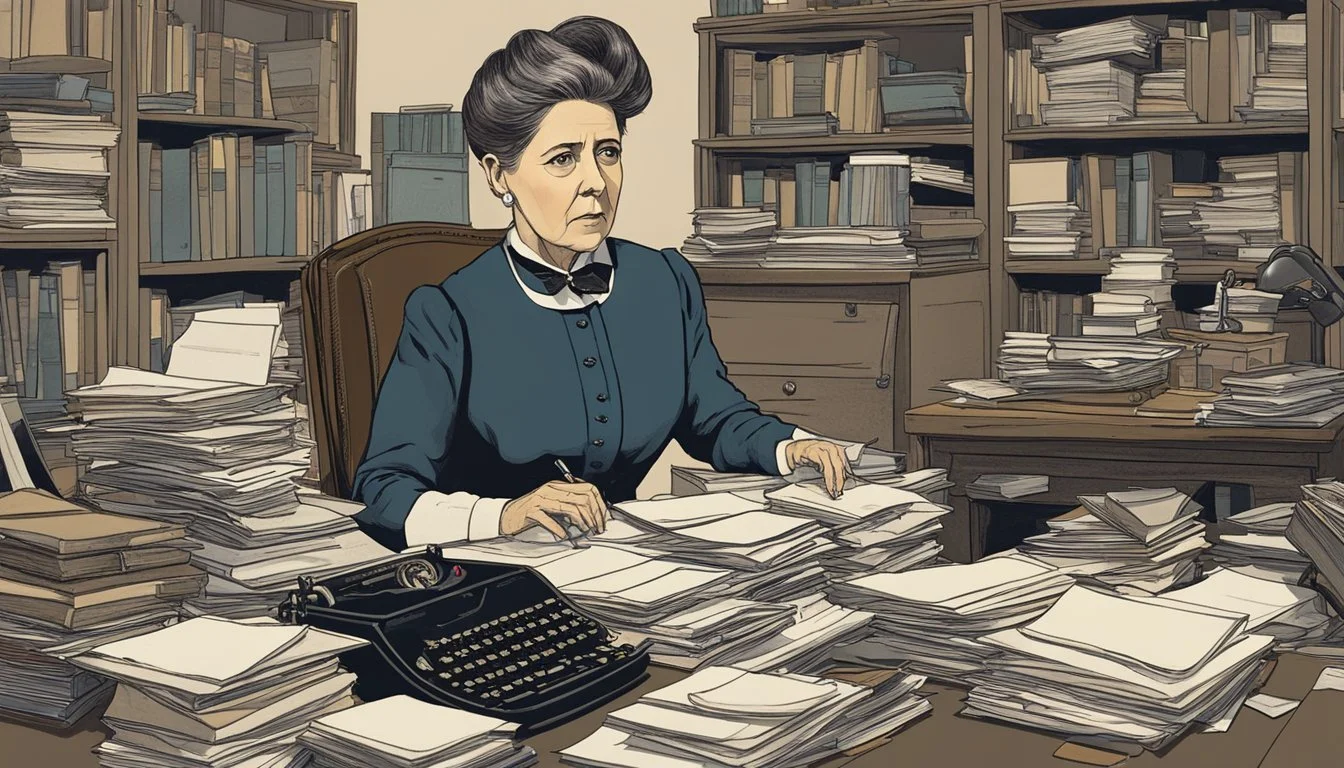Ida Tarbell: How America's Original Muckraker Became the Story
Pioneering Journalist's Impact on Corporate Accountability
Ida Tarbell carved her name into American history as a pioneering investigative journalist and muckraker of the Progressive Era. Born in 1857 in Pennsylvania during the oil boom, Tarbell's early experiences would shape her future as a formidable critic of corporate monopolies.
Tarbell's groundbreaking exposé of Standard Oil Company, published between 1902 and 1904, revolutionized investigative journalism and helped bring about the breakup of one of America's most powerful monopolies. Her meticulous research and compelling narrative style made complex business practices accessible to the public, earning her recognition as one of the most influential journalists of the 20th century.
As a woman in a male-dominated field, Tarbell faced numerous challenges. Yet her dedication to uncovering the truth and her skillful writing propelled her to the forefront of the muckraking movement. Tarbell's work not only changed the landscape of American journalism but also played a crucial role in shaping public opinion and influencing government policy during a time of rapid industrial growth and social change.
Early Life and Education
Ida Tarbell's formative years were shaped by her rural upbringing in Pennsylvania and her pursuit of higher education. These experiences laid the foundation for her future career as a pioneering journalist and investigative reporter.
From Log Cabin to Chautauqua
Ida Minerva Tarbell was born on November 5, 1857, in a log cabin in Erie County, Pennsylvania. Her family moved to Titusville, Pennsylvania when she was young, placing her at the center of the oil boom.
Tarbell's childhood was marked by intellectual curiosity. She attended public schools and developed a passion for reading and writing.
The Chautauqua movement played a significant role in Tarbell's early education. This adult education program exposed her to a wide range of subjects and speakers, fostering her love for learning and critical thinking.
Higher Learning at Allegheny College
In 1876, Tarbell enrolled at Allegheny College in Meadville, Pennsylvania. She was one of only a few women in her class.
At Allegheny, Tarbell excelled academically. She studied biology and developed strong research and writing skills that would serve her well in her future career.
Tarbell graduated in 1880 as the only woman in her class. Her time at Allegheny College strengthened her intellectual abilities and prepared her for a life of inquiry and investigation.
Path to Journalism
Ida Tarbell's journey to becoming a pioneering investigative journalist was shaped by her European experiences and a fortuitous connection with McClure's Magazine. Her time abroad expanded her horizons, while joining McClure's provided the platform for her groundbreaking work.
European Influences and The Sorbonne
Tarbell's path to journalism took a defining turn when she moved to Paris in 1891. She enrolled at the prestigious Sorbonne, immersing herself in French culture and intellectual circles. This experience broadened her perspectives and honed her analytical skills. In Paris, Tarbell began writing biographical sketches of French Revolutionary figures, developing her talent for in-depth research and compelling storytelling.
Joining McClure's Magazine
In 1894, Tarbell returned to the United States and joined McClure's Magazine, a pivotal move in her career. At McClure's, she found a nurturing environment for her investigative instincts. The magazine's commitment to exposing social and political issues aligned perfectly with Tarbell's growing interest in uncovering hidden truths. Her early assignments, including a series on Napoleon Bonaparte, showcased her meticulous research methods and engaging writing style.
Exposing Standard Oil
Ida Tarbell's investigation into Standard Oil Company became a landmark work of investigative journalism. Her meticulous research and compelling writing exposed the monopolistic practices of John D. Rockefeller's oil empire, leading to significant legal and regulatory changes.
Research and Writing The Magnum Opus
Tarbell spent two years researching Standard Oil's history and operations. She pored over thousands of public documents, court records, and newspaper articles. Tarbell also conducted interviews with oil industry insiders, including former Standard Oil employees.
Her 19-part series, "The History of the Standard Oil Company," was published in McClure's Magazine from 1902 to 1904. The exposé detailed Standard Oil's aggressive tactics, including:
Predatory pricing to undercut competitors
Secret deals with railroads for preferential rates
Covert ownership of seemingly independent companies
Tarbell's clear, fact-based writing made complex business practices accessible to the general public. She focused on the human impact of Standard Oil's monopoly, highlighting the struggles of independent oil producers.
Impact on Monopolies and the Legal Landscape
Tarbell's work sparked widespread public outrage against Standard Oil and other trusts. It contributed to growing anti-monopoly sentiment in the United States. President Theodore Roosevelt cited Tarbell's research in his push for stronger antitrust legislation.
The exposé played a crucial role in the 1911 Supreme Court decision to break up Standard Oil under the Sherman Antitrust Act. This landmark ruling established precedents for future antitrust cases. Tarbell's investigation also:
Raised awareness of the power of investigative journalism
Inspired other muckrakers to investigate corporate abuses
Influenced public opinion on the need for business regulation
The "History of the Standard Oil Company" remains a classic of investigative reporting, cementing Tarbell's reputation as a pioneering muckraker.
Muckraking and Public Appeal
Ida Tarbell's investigative work exemplified the muckraking movement, exposing corporate misconduct and influencing public opinion through popular magazines. Her methods and choice of platform played crucial roles in shaping investigative journalism and driving social change.
Contributions to Investigative Journalism
Tarbell pioneered in-depth research techniques for journalism. She meticulously gathered evidence, conducted interviews, and analyzed documents to build compelling cases against powerful entities like Standard Oil.
Her work set new standards for factual reporting and objectivity. Tarbell's approach combined thorough research with clear, engaging writing that appealed to a broad audience.
She tackled complex topics like business monopolies and made them accessible to the public. This helped educate readers on important issues and spurred calls for reform.
Tarbell's investigations often spanned multiple issues of magazines, allowing for comprehensive coverage of her subjects. This format enabled her to present detailed evidence and build convincing arguments over time.
The Role of Magazines in Muckraking
Magazines like McClure's and later American Magazine provided crucial platforms for muckraking journalism. These publications reached wide audiences and had the space for long-form investigative pieces.
Monthly installments of investigative series built anticipation and kept readers engaged over extended periods. This format allowed for in-depth exploration of complex topics.
Magazines' national circulation helped spread muckrakers' findings across the country. This broad reach amplified the impact of investigative reporting on public opinion and policy debates.
Publication in respected magazines lent credibility to muckrakers' work. It positioned investigative journalism as a legitimate and important form of reporting.
The success of muckraking articles often boosted magazine sales and readership. This created a mutually beneficial relationship between investigative journalists and their publishing platforms.
Tarbell's Major Works
Ida Tarbell produced influential biographies and a personal memoir that showcased her investigative skills and storytelling prowess.
Biographical Masterpieces
Tarbell's biographical works cemented her reputation as a meticulous researcher and compelling writer. Her two-volume biography of Abraham Lincoln, published in 1900, offered fresh insights into the president's life and character. The book's success led to a four-volume expanded edition in 1911.
Tarbell also penned biographies of Napoleon Bonaparte and Madame Roland. Her work on Napoleon, published in 1895, explored the emperor's complex personality and military genius. The biography of Madame Roland, completed during Tarbell's time in Paris, delved into the life of the influential French Revolutionary figure.
Personal Memoir: All in the Day's Work
In 1939, Tarbell published her autobiography, "All in the Day's Work." This candid memoir chronicled her journey as a pioneering female journalist and muckraker. Tarbell reflected on her experiences investigating Standard Oil and her encounters with key figures of the Progressive Era.
The book offered readers a behind-the-scenes look at her investigative methods and the challenges she faced as a woman in a male-dominated field. Tarbell's memoir provided valuable insights into the early days of investigative journalism and the social reforms of the early 20th century.
Influence on Progressive Era
Ida Tarbell's investigative journalism had a profound impact on American society during the Progressive Era. Her work exposed corporate abuses and corruption, galvanizing public opinion and catalyzing significant reforms.
Challenging Big Business
Tarbell's exposé of Standard Oil in McClure's Magazine shook the foundations of American business. Her meticulous research uncovered the monopolistic practices of John D. Rockefeller's empire. The series, published from 1902 to 1904, revealed how Standard Oil used predatory pricing and secret transportation deals to crush competitors.
This groundbreaking work caught the attention of President Theodore Roosevelt. He used Tarbell's findings to support his antitrust efforts. The impact was immediate and far-reaching. In 1911, the Supreme Court ordered the dissolution of Standard Oil, citing many of the abuses Tarbell had documented.
Shaping Public Policy
Tarbell's influence extended beyond the oil industry. Her work for American Magazine continued to shape public discourse on economic and social issues. She advocated for labor rights, women's suffrage, and corporate accountability.
Her writings helped build support for key Progressive Era reforms. These included antitrust legislation, child labor laws, and regulations on food and drug safety. Tarbell's clear, fact-based reporting style set a new standard for journalism.
Politicians and policymakers often cited her work when arguing for new laws. Her influence helped create a more informed and engaged citizenry, essential for the democratic reforms of the era.
Legacy and Recognition
Ida Tarbell's groundbreaking investigative journalism left an indelible mark on American society. Her work exposed corporate abuses and shaped public opinion, inspiring future generations of reporters and reformers.
Awards and Posthumous Honors
Tarbell received numerous accolades during her lifetime and after her death. In 1999, New York University ranked her book "The History of the Standard Oil Company" fifth on its list of top 100 works of 20th-century American journalism. The National Women's Hall of Fame inducted Tarbell in 2000, recognizing her pioneering role as a female journalist.
Allegheny College, her alma mater, established the Ida M. Tarbell House as a National Historic Landmark in 1989. This honor preserves her childhood home and commemorates her contributions to American journalism and social reform.
Ida Tarbell's Enduring Impact
Tarbell's meticulous research and compelling writing style set new standards for investigative journalism. Her exposé of Standard Oil's monopolistic practices during the Gilded Age led to the company's breakup and influenced antitrust legislation.
Her work continues to inspire journalists and historians. Many credit Tarbell with helping establish the field of investigative reporting. Her fearless approach to uncovering corporate wrongdoing paved the way for future "muckrakers" and watchdog journalists.
Tarbell's legacy extends beyond journalism. Her writings on women's issues and American history continue to be studied and debated. Despite battling pneumonia in her later years, Tarbell's influence persists, shaping discussions on corporate responsibility and journalistic ethics to this day.
Later Life and Personal Philosophy
Ida Tarbell's later years were marked by reflection, advocacy, and continued dedication to journalistic principles. She remained active in social causes while contemplating her life's work and impact.
Reflections on Journalism and Life
Tarbell penned her autobiography, "All in the Day's Work," in 1939. This memoir provided insights into her career and personal philosophy. She emphasized the importance of thorough research and impartial reporting.
Tarbell believed journalism should serve the public interest. She advocated for ethical practices and warned against sensationalism in the media.
In her later years, Tarbell lectured extensively on journalism ethics and the role of the press in society. She encouraged aspiring reporters to maintain integrity and pursue truth relentlessly.
Advocacy for Social Causes
Despite retiring from active journalism, Tarbell remained committed to social reform. She became a member of the National Unemployment League, working to address economic challenges during the Great Depression.
Tarbell supported various progressive causes, including women's rights and labor reforms. She wrote articles and gave speeches on these topics well into her seventies.
Her advocacy extended to international affairs. Tarbell voiced concerns about rising militarism and promoted peaceful conflict resolution.
In 1944, Ida Tarbell passed away from pneumonia at the age of 86. Her legacy as a pioneering investigative journalist and social advocate endures.
Context and Historical Significance
Ida Tarbell emerged as a pivotal figure during the tumultuous Gilded Age, shaping American narratives through her groundbreaking investigative journalism. Her work exposed corporate misconduct and influenced public opinion on big business practices.
Ida M. Tarbell: A Figure of the Gilded Age
Born in 1857 in Erie County, Pennsylvania, Ida Tarbell grew up during America's Oil Boom. Her father's oil business was destroyed by John D. Rockefeller's Standard Oil Company, sparking her interest in corporate practices.
Tarbell witnessed firsthand the rapid industrialization and economic disparities of the Gilded Age. This era, marked by corruption and monopolies, provided the backdrop for her investigative work.
She moved to Cleveland in her youth, gaining exposure to the epicenter of the oil industry. This experience informed her later writings on Standard Oil.
Tarbell's Impact on American Narratives
Tarbell's 19-part exposé on Standard Oil, published in McClure's Magazine, redefined investigative journalism. Her meticulous research and compelling writing style captivated readers across the nation.
Her work contributed to the rise of "muckraking" journalism, a term coined by President Theodore Roosevelt. This new form of reporting aimed to uncover social and political injustices.
Tarbell's investigations led to increased public scrutiny of monopolistic practices. Her writings played a role in the eventual breakup of Standard Oil in 1911, demonstrating the power of journalism to effect change.
Her legacy extends beyond her time, influencing generations of journalists and shaping the American Experience. Tarbell's work remains a cornerstone of American history, exemplifying the impact of fearless reporting on society.


